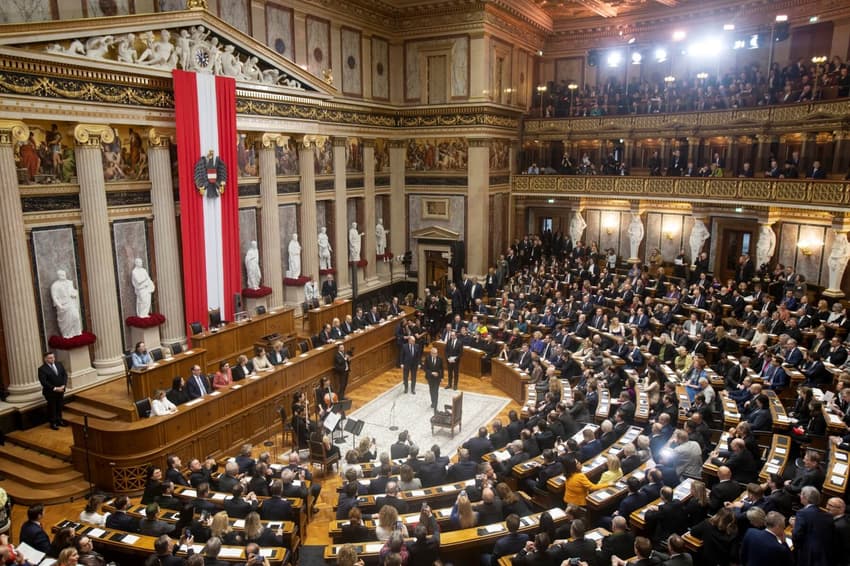How much power do Austria's state governments hold?

With 2024 being an election year in Austria, knowing how power is distributed between the federal and state governments is essential, as each has critical responsibilities.
While Austrians will go to the polls sometime in the autumn to select their new 'Nationalrat' (National Council), or lower house of the federal government, Vorarlberg and Styria will also be holding elections before the end of the year.
When Austria was declared an independent state after World War Two, on May 15th 1955, much of the powers of government were delegated to Austria's state governments. However, as time progressed, Vienna's federal government reclaimed many powers.
The federal government in Vienna has control over central matters such as defence, foreign policy, most taxation matters, healthcare, education, and the legal system. These powers are written into the Constitution, and the distribution of these powers is the subject of debate and revision to this day.
READ ALSO: How do Austrians elect their chancellor?
Where do state governments in Austria step in?
This isn't to say that the states don't exercise a great deal of power, however. Each state can make, enact and implement laws regarding housing and planning - essential to the growth and development of communities. They can also introduce laws regarding tourism, the protection of natural resources, and hunting, which are significant sources of revenue for the nation.
State governments are in charge of setting policy regarding Kitas, daycares and early childhood areas. They are also the level of government responsible for waste management and enforcing specific community laws, such as restrictions on alcohol within designated areas.
States can also prevail on federal courts and auditors to decide in their favour. Several incidents have occurred where national infrastructure projects have been halted due to state governments lodging protests.
It's important to note that the states also have some control over taxation. As the collector of taxation from individuals and businesses, they can also collect their own minor sources of taxation, such as regional ORF fees, property taxes and other similar costs.
READ ALSO: Everything you need to know about Austria's new ORF/GIS TV fee

ORF fees can differ depending on where you live in Austria. Photo: Pexels/Cottonbro Studios
Austrian federalism changes
One thing that is also important to consider is that Austrian federalism is constantly evolving.
Revenue sharing between the states and the federal government is time-limited and renegotiated regularly. Discussions between the states and the federal government regarding legislative responsibilities are also possible via 'Osterreich-Konvents' (Austrian Conventions).
While it may seem that participating in state elections is redundant, considering that they don't have the degree of control over such central matters as the federal government, they still have much influence over everyday affairs.
Having your voice heard at the state level is an integral way to influence day-to-day life in your part of Austria. So if you have the right to vote in Austrian elections - no matter the level - it's well worth doing.
Comments
See Also
While Austrians will go to the polls sometime in the autumn to select their new 'Nationalrat' (National Council), or lower house of the federal government, Vorarlberg and Styria will also be holding elections before the end of the year.
When Austria was declared an independent state after World War Two, on May 15th 1955, much of the powers of government were delegated to Austria's state governments. However, as time progressed, Vienna's federal government reclaimed many powers.
The federal government in Vienna has control over central matters such as defence, foreign policy, most taxation matters, healthcare, education, and the legal system. These powers are written into the Constitution, and the distribution of these powers is the subject of debate and revision to this day.
READ ALSO: How do Austrians elect their chancellor?
Where do state governments in Austria step in?
This isn't to say that the states don't exercise a great deal of power, however. Each state can make, enact and implement laws regarding housing and planning - essential to the growth and development of communities. They can also introduce laws regarding tourism, the protection of natural resources, and hunting, which are significant sources of revenue for the nation.
State governments are in charge of setting policy regarding Kitas, daycares and early childhood areas. They are also the level of government responsible for waste management and enforcing specific community laws, such as restrictions on alcohol within designated areas.
States can also prevail on federal courts and auditors to decide in their favour. Several incidents have occurred where national infrastructure projects have been halted due to state governments lodging protests.
It's important to note that the states also have some control over taxation. As the collector of taxation from individuals and businesses, they can also collect their own minor sources of taxation, such as regional ORF fees, property taxes and other similar costs.
READ ALSO: Everything you need to know about Austria's new ORF/GIS TV fee

Austrian federalism changes
One thing that is also important to consider is that Austrian federalism is constantly evolving.
Revenue sharing between the states and the federal government is time-limited and renegotiated regularly. Discussions between the states and the federal government regarding legislative responsibilities are also possible via 'Osterreich-Konvents' (Austrian Conventions).
While it may seem that participating in state elections is redundant, considering that they don't have the degree of control over such central matters as the federal government, they still have much influence over everyday affairs.
Having your voice heard at the state level is an integral way to influence day-to-day life in your part of Austria. So if you have the right to vote in Austrian elections - no matter the level - it's well worth doing.
Join the conversation in our comments section below. Share your own views and experience and if you have a question or suggestion for our journalists then email us at [email protected].
Please keep comments civil, constructive and on topic – and make sure to read our terms of use before getting involved.
Please log in here to leave a comment.